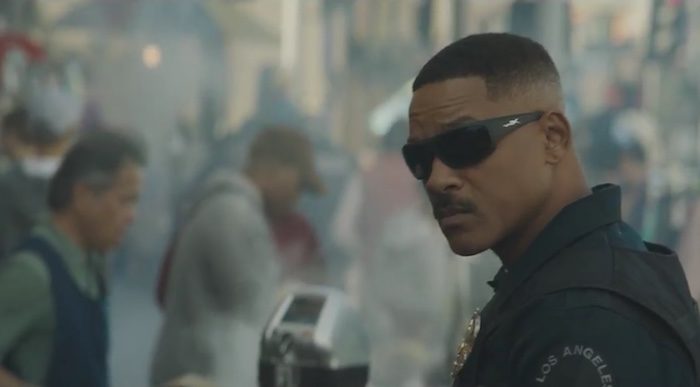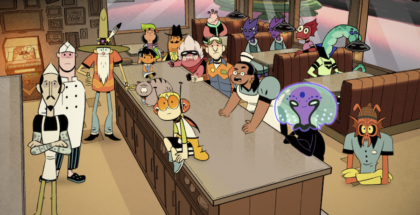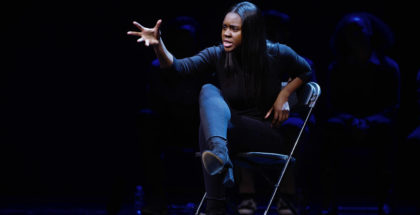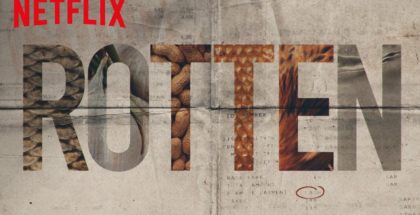Christopher Nolan wrote to Netflix to apologise for “mindless” criticism
David Farnor | On 08, Nov 2017
Christopher Nolan has revealed that he wrote to Netflix to apologise for his criticism of the streaming service’s movie strategy as “mindless”.
The Dunkirk director is famed for his stance as one of cinema’s last defenders, standing up against the rise of streaming to preserve the sanctity of the shared theatrical experience. Speaking to IndieWire this summer, he slammed the online giant’s model as “pointless”, at a point where the company is stepping up its feature film development, including high-profile blockbusters such as David Ayer’s Bright (pictured above), out this Christmas.
“Netflix has a bizarre aversion to supporting theatrical films,” he said at the time. “They have this mindless policy of everything having to be simultaneously streamed and released, which is obviously an untenable model for theatrical presentation.”
Now, speaking to Variety in a wide-ranging interview that is well worth reading in full, he has admitted that he was harsh – not in terms of his view, which he stands by, but the way he expressed it. And, he added, he wrote to Netflix’s Chief Content Officer, Ted Sarandos, to say sorry.
“I should have been more polite,” he said. “I said what I believe, but I was undiplomatic in the way I expressed it. I wasn’t giving any context to the frankly revolutionary nature of what Netflix has done. It’s extraordinary. They need appropriate respect for that, which I have.”
The rise of Netflix is also inexorably tied to the rise of television, which is proclaimed by many to be in a hallowed golden age.
“
“I view movies and television as different, and the conventional thinking right now is that they must converge and become the same thing,” added Nolan. “A scenario in which movies and television become more similar elevates television but diminishes movies.”
Netflix is also ushering in a shift in attitude in the movie business towards digital distribution, as studios look to close the window between a cinema release and a home entertainment release to combat piracy and meet consumer demand and expectations. Talks continue throughout the industry, as distributors and exhibitors attempt to work out a compromise that could see the cinemas get a cut of the rental income for films released online in a premium window. Nolan is not a fan.
“My entire adult life they have released straight-to-video films,” he told Variety. “As a filmmaker, when I was starting out in the 90s, your nightmare was the straight-to-video release. There’s nothing new about it — what’s different and new about it is selling it to Wall Street as innovation or disruption.”
“Every other industry, whether it’s the car industry or whatever, controls when a product is launched,” he added, reportedly referring to the book world and the way that hardbacks are still published ahead of paperbacks in a staggered window system. “The idea that the film business should forget that and just throw everything together at the same time makes no sense. It’s not good business, and people will realise that eventually.”
The debate continues.
Will Smith responds to Christopher Nolan Netflix critique
21st July 2017
This weekend sees Dunkirk land in cinemas across the UK, at the same time that Netflix is taking its own blockbuster, Bright, to Comic-Con. Both are big budget movies with a lot of media buzz. Both feature a raft of big stars – Kenneth Branagh, Mark Rylance, and Will Smith and Joel Edgerton – and both have directors of note (Christopher Nolan, David Ayer) attached. There’s one crucial different, though: one of them is being distributed into theatres, while the other will be released on Netflix.
The streaming giant has significantly stepped up its feature film game in the last year, hiring former Universal chief Scott Stuber to lead its development arm. The move has not been universally well received, though, sparking debates at Cannes (and the effective banning of films not released in French cinemas from the festival in the future) and drawing fresh criticism from Nolan.
The Inception and Dunkirk director has never been shy about his lack of fondness for Netflix’s approach to releasing films, which aims for day-and-date distribution, as opposed to preserving the usual theatrical window before releasing it online.
Speaking to IndieWire this week, Nolan spoke out against Netflix once more, slamming their model as “pointless”.
“Netflix has a bizarre aversion to supporting theatrical films,” he said. “They have this mindless policy of everything having to be simultaneously streamed and released, which is obviously an untenable model for theatrical presentation.”
Nonetheless, Netflix is funding projects such as Okja, which would not have been made otherwise in the current movie business climate.
“I think the investment that Netflix is putting into interesting filmmakers and interesting projects would be more admirable if it weren’t being used as some kind of bizarre leverage against shutting down theaters,” he added. “It’s so pointless. I don’t really get it.”
Ava DuVernay, director of Disney’s A Wrinkle in Time and Netflix documentary 13th, responded on Twitter, asking what if there’s no cinema in your neighbourhood.
Indeed, not all filmmakers agree on the role of Netflix in the future of film.
“If you can find a way to work in the system, it’s a very powerful machine,” Nolan concluded of the traditional business, “with a lot of resources, and excellent distribution mechanisms.”
Now, after speaking in Netflix’s defence at Cannes, Will Smith has again stepped up to field criticisms of the streaming service. Speaking at Comic-Con, where he was promoting Bright, Smith joked: “I think Mr. Nolan’s a wonderful director and I will not say anything that keeps me from being in his next movie… I don’t like your attitude about Mr. Nolan!”
But he added that there is a difference between the two mediums, and that one is not trying to replace the other.
“I think there are certain things that you want to see on a big screen,” he explained. “I remember the Christmas that Avatar came out and our entire family rushed out on Christmas Day to go with the glasses and all that. So there’s experience, specifically the type of films that Chris makes. You want to see them in that space. It’s like the venue is a part of the experience.”
“I have 16-year-old, a 19-year-old, and a 25-year-old at home,” Smith continued. “So their viewing habits are almost anthropological. It’s a great study in being able to see they still go to the movies on Friday, Saturday night, and they watch Netflix all week. So it’s two completely different experiences, but it’s definitely a different experience. I don’t think anyone is trying to say it’s an identical experience.”
Both Smith and Ayer also highlighted the artistic freedom they were given on the project.
“[The] risk profile is different,” said Smith “So Netflix can make a hard, rated R movie for a $170 million. Studios can’t do that if the executive wants to be at work on Monday.” And, as according to Smith, Netflix can factor the hard math of their subscription base down to numbers that confirm artists can take lucrative risks.
“Because they work on the specific data, they know ahead of time that with the director of Suicide Squad, and with me at this point in my career, and they go through and have numbers on everyone. And they say, ‘Yes it works,’ and they go into [the movie] even before you shoot it. So it’s a completely different basis of how they work, and the trickle down is [that] between action and cut, we get to do whatever we want.”
Should Netflix films be in cinemas or straight to VOD? Listen to our discussion on our podcast, The VOD Pod.




















